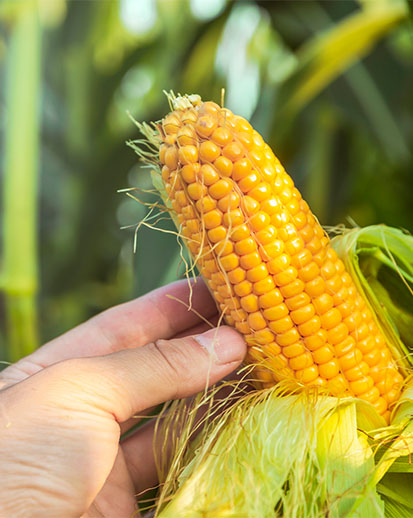Trends
Our Nutrition business addresses significant trends that influence the health of people and of the planet. In Animal Nutrition & Health, we address the growing requirement for the sustainable production of animal protein. In Human Nutrition & Health, we address the growing demand for (personalized) health solutions, including the need to provide delicious, nutritious and sustainable food and beverage choices for all.
Enabling the sustainable production of animal protein
Animal-based proteins are highly nutritious and form a key part of a balanced, healthy diet. Their consumption is also central to many cultures, and animal-source foods and other animal-source products play an important socio-economic role in those cultures. However, livestock production comes at a cost. This cost is increasingly evident. Rising demand for animal protein is driving up greenhouse gas (GHG) emissions and piling pressure on natural resources. In some cases, this pressure has already transgressed accepted planetary boundaries. The planetary boundaries include the Earth’s tolerance thresholds in terms of GHG emissions, biochemical flows, water quality and quantity, land use, and biodiversity. The agri-food sector is one of the major contributors to global GHG emissions, and almost a third of wild fisheries are overexploited. The sustainability of animal protein production is now front and center in the minds of many, with widespread calls for change from the value chain, policy makers and associated stakeholders.
The world’s population is projected to reach 9.7 billion by 2050. At the same time, demand for healthier, balanced, and more nutrient-dense diets is increasing — driven not only by the growth of the world’s population but also by changing health awareness and consumer expectations. The possibilities afforded by a growing range of plant-based alternatives to protein might go some way to filling this gap. However, demand is still likely to grow as many populations need to raise their animal protein intake to attain a level of balanced, healthy nutrition. Enabling sustainable animal production is therefore of paramount importance.
Our solutions
We strongly believe in and advocate for a radical transformation of animal farming and food systems to ensure a sustainable future. We are convinced that the livestock industry can transform itself from within to deliver solutions to the challenges facing society and the animal protein industry. We are well positioned to play a key role in this transformation. That is why in Animal Nutrition & Health, we focus on the following six sustainability platforms to support our customer, the livestock value chain and other stakeholders to address the environmental challenges facing our planet:
- Improving the lifetime performance of farm animals
- Making efficient use of natural resources
- Reducing emissions from livestock
- Helping tackle antimicrobial resistance
- Reducing our reliance on marine resources
- Improving the nutritional quality of meat, milk, fish and eggs while reducing food loss and waste
To tackle these challenges, we have an extensive existing portfolio structured into Essential Products and Performance Solutions.
Our Essential Products provide our customers with the highest quality core vitamins, premixes and carotenoids that are essential for life and lie at the heart of an animal’s healthy development, all delivered in the most flexible and tailored way.
Covering enzymes, microbes and eubiotics, our Performance Solutions combat mycotoxins and tackle antimicrobial resistance. They also optimize gut health, feed conversion and feed efficiency, thereby reducing emissions from livestock. As a result, fewer natural resources, such as land and water, are needed for the production of animal protein production.
In addition to our Essential Products and Performance Solutions, we are also successfully rolling out our methane-reducing feed additive for ruminants, Bovaer® and further extending our capabilities in precision nutrition, building on the foundations of our globally recognized Optimum Vitamin Nutrition™ (OVN™) concept. More information on our solutions for sustainable animal farming can be found in the case study in this Report.
The growing demand for (personalized) health solutions
Despite growing understanding of the central role of nutrition in supporting immune function and healthy growth and development, the world continues to face a wide range of food-related health issues and challenges. In today’s world, according to the 2020 Global Nutrition Report, “One in every nine people in the world is hungry, and one in every three is overweight or obese. More and more countries experience the double burden of malnutrition, where undernutrition, coexists with overweight, obesity and other diet-related non-communicable diseases (NCDs). The trend is clear: progress is too slow to meet the global targets. Almost a quarter of all children under 5 years of age are stunted. At the same time, overweight and obesity are increasing rapidly in nearly every country in the world, with no signs of slowing.” A 2021 UN report indicated that conflict, climate change and COVID-19 forced more people into hunger.
While many low- and middle-income countries are still grappling with fundamental problems of food and nutrition security, the world’s food systems as a whole are coming under growing scrutiny. Food poverty exists in even the richest countries of the world, as the continuing prevalence of food banks demonstrates. Governments, NGOs, academia and the private sector worldwide need to develop evidence-based approaches that will deliver affordable, accessible and nutritious diets for all people in all countries at all stages of the life cycle.
The crucial role of nutrition in supporting immune function was thrown into sharper perspective than ever during the COVID-19 pandemic, accelerating the existing trend toward personalized health and nutrition. The pandemic simultaneously accelerated the use of digital communications in delivering these solutions, as consumers increasingly sought to boost their immune systems with the aid of fortified foods and dietary supplements researched and purchased online.
There is growing interest worldwide in personalized nutrition — science-based, data-driven nutritional solutions tailored to consumers’ specific health goals and needs. Differences in age, genotype and health status mean that individuals can react in very different ways to the same foods. Personalized nutrition allows individuals to make dietary choices tailored to their specific needs, reducing their exposure to a wide range of non-communicable diseases and helping to lower healthcare costs.
There is also a growing demand for plant-based alternatives alongside traditional meat, fish and dairy products, as consumers search for foods that deliver an authentic eating experience without compromising on taste and texture. Whether for personal, health or sustainability reasons, or from plain curiosity, more and more people are adding plant-based options to their food choices and are adopting flexitarian, vegetarian, or vegan diets. At the same time, the importance of a quality nutritional profile is attracting increasing recognition.
Our solutions
Our portfolio of nutritional ingredients covers a wide range of products essential for good nutrition, food enzymes, nutritional lipids, carotenoids, cultures, human milk oligosaccharides (HMOs) and hydrocolloids. Our capabilities were expanded in 2021 by the acquisition of First Choice Ingredients, a leading supplier of dairy-based savory flavorings, and Vestkorn Milling, one of Europe’s leading producers of pea- and bean-derived ingredients for plant-based protein products. Our offering is driven by a mixture of in-house innovation (including partnerships) and targeted acquisitions. We also develop, both in-house and in collaboration with partners, our own offerings in the fields of zero-calorie sweeteners (EVERSWEET™), proteins, skin actives and sun filters.
As a global pioneer in the industrial production of vitamins, we cover the entire range of critical micronutrients, whose efficacy continues to reveal itself in new ways. We have, for example, a new range of Market-Ready Solutions to enable our customers to launch new immunity-supporting products in a matter of months. Rapidly evolving evidence suggests an association between vitamin D levels and sensitivity to viral infections such as COVID-19. In 2021, we launched our immunity-supporting solution ampli-D®, our fast-acting form of vitamin D for dietary supplements.
In the field of meat, fish and dairy alternatives, we offer a range of solutions for analogs that deliver proteins, authentic taste and create succulent, chewy texture. At the same time, because our yeast extracts unlock full umami flavor, producers can reduce the amount of added salt in their recipes, improving the health appeal, while our breadth of vitamins and other micronutrients as well as nutrition science expertise helps producers to improve the nutritional profile of their plant-based offerings. The case study in this Report provides more detail on how we enable tastier, more nutritious plant-based choices for consumers.





